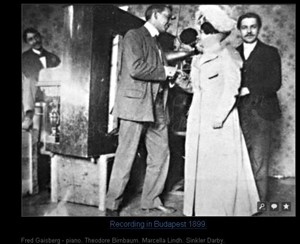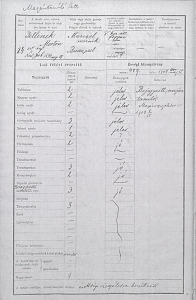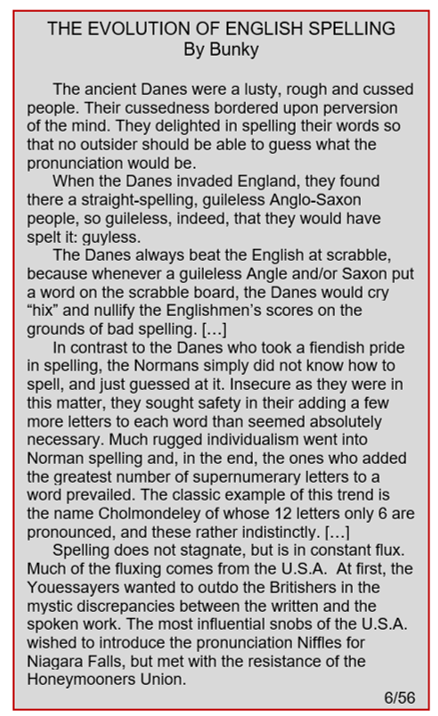Correspondence between Mark Keller and Thelma Pierce Anderson (1963-1990): Part 3
This is the third part of a series featuring a great treasure of the Center of Alcohol Studies Archives: the correspondence between Mark Keller and Thelma Pierce Anderson, one of Jellinek’s former wives. Part 1 was published in the March 2014 issue of the CAS Information Services Newsletter (pages 6-7). Part 2 is available in the February 2015 issue (pages 1-4). The correspondence between Thelma and Keller is a great resource to find out more about Jellinek, the person. The last part of the series highlights Jellinek’s many talents as discussed in these letters.
The subject of writing Jellinek’s biography came up in the first round of letters in the 1960s, immediately after Jellinek’s death. It was picked up again in the letters dated 1984. Although Thelma can be considered one of the rare people who could understand Bunky at many levels, she expresses her doubts about the project and her ability to complete it. Her words reflect on the complexities of Jellinek’s character.
I am not sure what should be the focus of the book, I THINK it should try to demonstrate the complex character of the man; should reveal, but not emphasize, some of the warts; should give enough inkling of his personal suffering and resultant empathy with sufferers to make credible his interest and involvement with a challenging field; should show a man who loved a challenge and who knew the satisfaction of winning against odds; should show a man who could fail and rise above failure; should, by anecdote, demonstrate his pride in accomplishment and in the receipt of honors; should include his playfulness and sense of humor; and should, by glimpses and innuendo demonstrate his fantastic versatility.
(Anderson to Keller, August 22, 1984)
A person of many talents, Jellinek was described as a great actor, singer, and even a female impersonator in the infamous book Conmen, vagabonds by László Frank (Frank, 1957). Thelma sheds some light on the family heritage of acting and singing:
His father was Erwin Marcel Jellinek who, at that time was an actor whose “Hamlet” had been proclaimed in Europe.
(Anderson to Keller, April 16, 1988)

Recording in Budapest, 1899
Fred Gaisberg – piano, Theodore Birnbaum,
Marcella Lindh, Sinkler Darby
We already referred to his mother, Marcella Lindh, the soprano, famous in the United States and Europe too.
Bunky’s mother was a friend not only of Verdi but of John Philip Sousa with whom she did a tour.
(Anderson to Keller, April 16, 1988)
The family’s cultural and educational background and the creative atmosphere of the era at the turn of the century had a great impact on the early life of Jellinek, as suggested by Thelma.
Additionally, Thelma also confirms Jellinek’s long-lasting interest in psychoanalysis.
Bunky was, as you no doubt know, analyzed by Ferenczi and he never lost his interest in psychoanalysis. I believe that he once met Sigmund Freud, though he did not know Freud well.
(Anderson to Keller, December 2, 1963)
Jellinek is described in Sándor Ferenczi’s letters to Freud as a
[…] very nice young Hungarian ethnologist, Jellinek (a millionaire and also an obsessional neurotic patient of mine, who will soon get his doctorate) […].
(Freud, 1993: Letter 683)
A recent finding in the correspondence is the following playful poem, a Bunky verse, related to this subject (without a date).
Hypnosis
Now you’re sixteen, now you’re five
Now you’re dead, now alive,
You’re a widow, you’re a virgin,
You’re a pumpkin, you’re a sturgeon,
You’re a pan and you’re a pot
You’re a damn fool, are you not?
By E. M. Jellinek
The poem proves not only his talent and playfulness, but also his strong ties to Hungarian folk art and poetry. Hungarian folk songs feature eight-syllable lines, cut into two sections, and ending in rhymed couplets (five –alive: pot – not). Downward trending stresses also characterize Hungarian folk songs. Jellinek is playing with the same rhyme scheme, a simple but powerful pattern in the following “Bunky verse” (to borrow Thelma’s phrase).
It has been questioned, time to time.
What constitutes a seamless rhyme.
A rhymeless seam is also quaint.
But Esquimos believe it ain’t.
By E. M. Jellinek
Praised for his broad interests as an alcohol researcher, Jellinek’s education and early scholarship shows deep roots in the humanities. As Thelma recalls:
Bunky was at one time most interested in philology. He did some outstanding work in the field as a very young man, possibly at Berlin, and thought seriously of becoming a philologist. At another period, also as a young man, he was most interested in comparative religion.
(Anderson to Keller, December 2, 1963)

Report card of “Jellinek Morton,” high school student:
1st semester grades in the left column, final grades
in the right. The document also claims that he was homeschooled by private tutors.
Image courtesy of Budapest Archives.
Jellinek’s high school report card from 1908 shows that he studied religion, Latin, Greek, and German and received good grades in both the first and second semesters (Grade of 1 being the best, spelled out as “jeles”).
Two new texts were also recently discovered in the Keller Collection, proving Jellinek’s education and outstanding talent–“two very witty (and erudite) essays, better, in my opinion, than the nonsense verse” (Keller to Anderson, 1988, May 20). Keller collected them from Vera Efron, QJSA Associate Editor, CAAAL indexer, and a talented artist (her sketches of Jellinek in this issue serve as illustrations). The first is a rendition of the Greek mythology, a Jellinekian description of Greek Gods and Goddesses (see excerpts later in this issue). The second is on the evolution of English spelling. Both are authored by Bunky and dated 1956.
Jellinek, talented in many languages, takes great pleasure in mocking English orthography, especially the letter–to–sound correspondences, from the perspective of a native speaker of Hungarian, a language with highly consistent correspondences between the written symbols and significant spoken sounds.
 Thelma’s letters also brought into attention one more interesting tidbit about Jellinek as a scientist, who demonstrated such a marked interest in disseminating research. As early as 1936, Jellinek had journal publishing experience prior to becoming involved with the Quarterly Journal of Studies on Alcohol. Here is how Thelma refers to Jellinek’s attempt to run a scholarly journal.
Thelma’s letters also brought into attention one more interesting tidbit about Jellinek as a scientist, who demonstrated such a marked interest in disseminating research. As early as 1936, Jellinek had journal publishing experience prior to becoming involved with the Quarterly Journal of Studies on Alcohol. Here is how Thelma refers to Jellinek’s attempt to run a scholarly journal.
[…] he started a publication called, I believe, the BIOMETRIC QUARTERLY. It was varityped by one Michaelena Cecelia Kaseta (of course Bunky loved that wonderful resounding name) and lived through possibly three issues.
(Anderson to Keller, December 2, 1963)
The actual name of the journal is Biometric Bulletin. It was founded by Jellinek in 1936, and ran for four issues during Jellinek’s years at the Worcester State Hospital. The Biometric Society launched a scholarly journal of its own with a similar title, Biometrics Bulletin, in 1945. The editor, Chester Bliss, who was instrumental in forming the Biometric Society, acquired the journal title from Jellinek for one dollar (Fertig, 1984). Jellinek, already the editor of QJSA by this time, supported this publication by contributing an article of his own in 1946.
Jellinek’s education in the classics remains observable in his later works related to alcohol studies. His annotations to some “firsts” in the alcohol literature were published along with the original texts in QJSA, and later in a bound volume entitled Classics of the Alcohol Literature, including the following articles:
- Immanuel Kant on drinking
- Erasmus Darwin on the physiology of alcohol
- Old Russian church views on inebriety
- Magnus Huss’ alcoholismus chronicus
- The observations of the Elizabethan writer Thomas Nash on drunkenness
- A specimen of the sixteenth century German drink literature: Obsopoeus’ Art of Drinking
- The ocean cruise of the Viennese: German poem of the thirteenth century
- Montaigne’s essay on drunkenness
(Bibliography…, 1966)
Reading and reflecting on classics occupied Jellinek’s mind throughout his life, even if publications are scarce. His notes and tape recordings later were carefully edited and professionally compiled by R. E. Popham and C. D. Yawney in 1966, and published as an article in the Journal of Studies on Alcohol in 1977 under the title The symbolism of drinking: A culture-historical approach (A bibliography…, 2015). They were also instrumental in making available another “classic” Jellinek article, Drinkers and alcoholics in ancient Rome (Jellinek, 1961), first as a substudy, then in JSA in 1976.
Discovering the correspondence between Keller and Thelma can be considered another milestone in investigating Jellinek’s life. These texts can provide new leads to follow and point alcohol historians to the right direction in many instances. The Center of Alcohol Studies Library continues to encourage librarians and archivists to explore their collections and share the wealth of hidden treasures. A great example of recent, unexpected discoveries is the only known existing sound recording of his voice, dated 1957, in a private collection. Concluding Part 3 is an excerpt from his 77–minute talk, in which Jellinek speaks about his daily routine of reading the classics.
[…] In the morning I scan the papers for the most recent news. In the evening it is my custom to take into my hand the works of some ancient Roman or Greek author, and to read some twenty or thirty pages. And then I begin to wonder whether what I read in the evening was the oldest news, or what I read in the morning was the newest olds. Of course, we are accustomed to saying that there is nothing new under the sun. […]
(Jellinek’s address, 1957)
References
- A comprehensive bibliography of E. M. Jellinek (2015). Rutgers Center of Alcohol Studies. Rutgers, The State University of New Jersey, Piscataway.
- Anderson, T. P. (1963, December 2). [Letter to Mark Keller]. Keller Files. Center of Alcohol Studies Archives, Rutgers, The State University of New Jersey, Piscataway.
- Anderson, T. P. (1988, April 16). [Letter to Mark Keller]. Keller Files. Center of Alcohol Studies Archives, Rutgers, The State University of New Jersey, Piscataway.
- Bibliography compiled from Classified Abstract Archive of the Alcohol Literature: E. M. Jellinek. (1966). Rutgers Center of Alcohol Studies Archives. Rutgers, The State University of New Jersey, Piscataway.
- Fertig, J. W. (1984). Biometric Bulletin history [Letter to the editor]. Biometric Bulletin, 1(3), 2.
- Freud, S., Ferenczi, S., Brabant, E., Falzeder, E., & Giampieri-Deutsch, P. (1993). The Correspondence of Sigmund Freud and Sándor Ferenczi, Volume 1: 1914-1919. Harvard University Press.
- Keller, M. (1988, May 20). [Letter to Thelma Anderson]. Keller Files. Center of Alcohol Studies Archives, Rutgers, The State University of New Jersey, Piscataway.
- Jellinek’s address. Recording of an A. A. Meeting, October, 29, 1957 [s. l.].
- Jellinek, E. M. (1961). Drinkers and alcoholics in ancient Rome (Substudy 2-J-61) [Mimeograph, prepared from notes and tape recordings by C. D. Yawney and R. E. Popham]. Toronto, ON: Addiction Research Foundation.
- Jellinek, E. M. (n. d.). The evolution of English spelling [unpublished]. Center of Alcohol Studies Archives, Rutgers, The State University of New Jersey, Piscataway.
- Worcester State Hospital (1931-1940). Annual Reports of the Trustees of the Worcester State Hospital. Gardner, MA: Occupational Printing Plant.
Published in the Jellinek Special Anniversary issue of the CAS Information Services Newsletter in 2015.